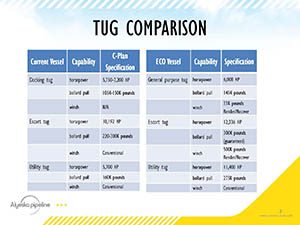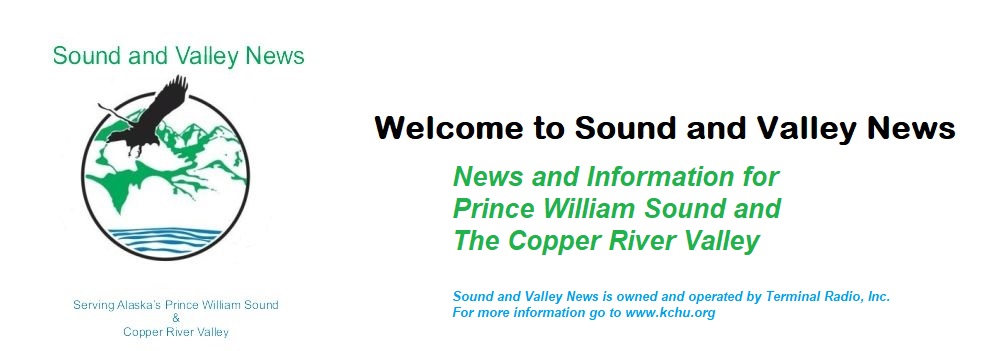Council conducting independent review of vessel designs

This Alyeska chart compares some of the capabilities and specifications of the new vessels to the current fleet. The council is independently analyzing the vessels’ design specifications. Image courtesy of Alyeska. (CLICK PHOTO FOR LARGER IMAGE.)
By July of 2018, Edison Chouest Offshore, or ECO, of Louisiana will be the marine services contractor for oil tankers and the terminal in Prince William Sound. Until then, Alyeska and ECO will be working with Crowley Maritime, the contractor who currently provides those services, on a smooth transition between the two contractors. These services include escort tugs, general purpose tugs, oil recovery storage barges and associated personnel, all of which are key oil spill prevention and response assets for Prince William Sound. For instance, two state-of-the-art escort tugs accompany every laden tanker that leaves Port Valdez. One tug is tethered through the confined waterway called the Valdez Narrows, and one tug stands by at Hinchinbrook Entrance until the tanker is 17 miles into the Gulf of Alaska. The primary responsibility of these escort tugs is to rescue or “save” a tanker that may experience problems and prevent oil from spilling, and initiate response efforts should these prevention measures fail.
Construction of new vessels
ECO has begun construction on the first of the new vessels. Five of the new tugs will have primary responsibility for escorting tankers carrying oil through Prince William Sound. Four new “general purpose” tugs will assist tankers docking at the terminal and tow oil response and storage barges. All nine tugs will scout for ice from Columbia Glacier and carry equipment for oil spill response and emergency towing, among other capabilities. All of the escort tugs, and two of the general purpose tugs, will carry equipment that will enable the crew to fight fires on another vessel. Three new spill response barges will be outfitted with Crucial oil skimmers, a new high-capacity skimming technology that provides a more efficient means of picking up oil on water, and Ocean Buster boom systems that are considered leading technology for containing oil slicks.
One existing ECO vessel, the Ross Chouest, will also be coming back to Alaska. The Ross Chouest was most recently on contract to Shell to retrieve anchors used for oil exploration in the Chukchi and Beaufort seas. The Ross Chouest will be used as an ice scout, oil spill response, to handle mooring anchors, as well as take part in Alyeska’s Ship Escort Response Vessel System’s annual fishing vessel training outside of Prince William Sound in the ports of Kodiak, Seward, and Homer.
New vessels may start arriving this year
Construction began last August on the first two general purpose tugs, and construction of the escort tugs began this winter. ECO is building the tugs at their shipyards in Louisiana and Mississippi. Equipment sea trials and the first exercises will be conducted in the Gulf of Mexico. The response barges will be built in Oregon and tested in Puget Sound.
The first general purpose tugs may launch as early as mid-2017, and may begin arriving in Prince William Sound in late 2017. The rest of the vessels will arrive at various times after construction is completed and initial on-water testing has been conducted. Additional demonstration exercises will be conducted in Prince William Sound in 2018, both before and after the July transition.
ECO plans to start recruiting personnel in mid-2017.
The council has been participating in a series of information-sharing meetings with Alyeska, ECO, Crowley, the oil shippers, Alaska Department of Environmental Conservation, and the U.S. Coast Guard, and we anticipate attending drills, exercises, and touring the vessel construction facilities starting later this year.
|
|
Council developing recommendations for equipment and training
The council has begun an independent review to verify that the vessels’ designs are appropriate for their intended use, that training programs are adequate to ensure that crews are experienced and proficient in Alaskan waters, and all efforts meet or exceed existing capabilities as well as state and federal requirements. Subject matter experts as well as local citizens with extensive experience in the cold Alaska maritime environment are working with the council to review the documents.
“This is a significant change in equipment and some personnel may be new to Alaska,” said Roy Robertson, the council’s drill monitor. “One of our main concerns is that all personnel should be well-trained and most should have experience with our unique conditions. Among other suggestions, we will be recommending that SERVS’ response coordinators ride along on escort trips to ensure that all the elements of the prevention and response system are well-understood and being followed.”
“The goal of our tug design analysis is to ensure that each vessel is appropriate for its intended use, and that the designs are optimal for ensuring the highest level of oil spill prevention and response capabilities to protect Prince William Sound and the downstream communities,” said Donna Schantz, executive director for the council.
The council will share the results of this work with Alyeska, Edison Chouest, the oil shippers and the regulatory agencies who will be evaluating the new equipment and personnel.
“The council was created to involve local citizens in decisions that impact the safe transportation of oil,” added Schantz. “After the Exxon Valdez spill, Congress found that only when local citizens are involved do the the partnerships and trust develop that is necessary to build the safest system possible. Our job is to independently review spill prevention and response plans, verify equipment and personnel capabilities, and advocate for the highest level of safeguards to protect the environment as well as the economic, social, and overall well-being of the people who live and work in the region.”
Update 1/27/2017:
The final report by the council has not yet been released. For more information:
- View the slides from Robert Allan Ltd’s presentation to the board of directors on 1/19/2017
- To request the audio of the presentation, please contact our Director of External Communications, Brooke Taylor: 907-277-7222 or by email.


